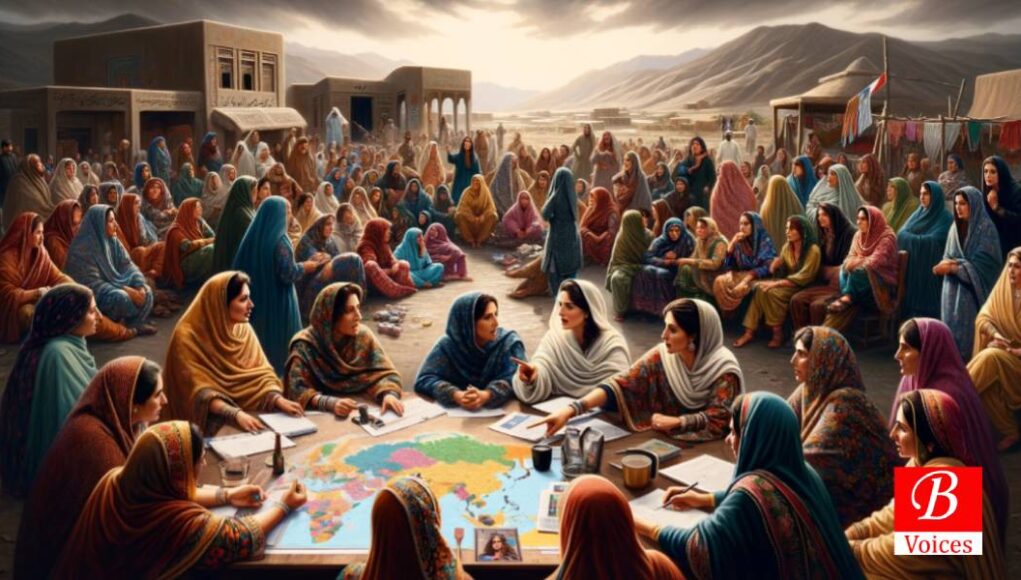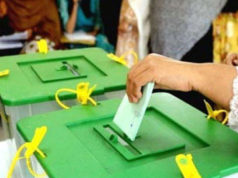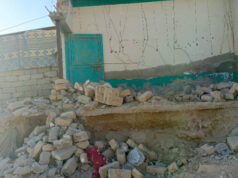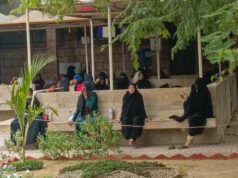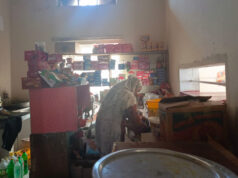Tahira Khan
Samina Hameed*, a resident of Loralai, recalled her previous observation regarding elections. Her constituency lay at the irrigation colony, Loralai, where she witnessed how women were not informed of the political process. According to her, women were not educated enough about where to put a thumbprint or what is a ballot box.
She continued;
“Presiding officers and staff members taught women about the process. However, they remained confused and unable to understand where to cast a vote. When the PO told them to cast their vote in a ballot box, few went to the washroom and few threw them out of the windows.”
Following that, she mentioned that almost every woman voted what they were told by their family members. They did not know even the names of the politicians for whom they were voting. Unfortunately, our society adopts a passive role for women where they do not know what is even the purpose of elections.
Similarly, Uroosa Gul also shared her observation regarding the role of women during elections. Uroosa is also a government servant and served in many elections as a Presiding Officer along with being a Master Trainer with ECP. She stated that traditional gender role plays a pivotal role in defining the outcome of elections in Balochistan. Women may come to polling stations to cast a vote but they do not know whom should they vote. Sometimes, it feels like the polling station is a kind of circus for them where they come and spend their day having chit-chat with other women or enjoying the clashes between polling agents.
Moreover, she also remarked that many families do not allow their women to visit polling stations during elections. However, they give their CNICs to some other women with a responsibility to cast a vote on their behalf. Many times, we have witnessed one woman carry even ten different ID cards of their family members who cast votes without being caught by the election staff.
In response, District ECP official, Tayyeb Bukhari, did not comment on the matter that how one women cast all family member votes because he said that he is newly appointed from Lahore. However, the Polling agent, Miss Alizia, answered this query. According to her, women change clothes or wear different robs/veils to remain unrecognizable beside having fake ID cards. Moreover, she also claimed that POs and staff don’t check whether the ID cards are fake or not.
On a question regarding harassment, Samina Hameed detailed the context in the following words;
“We live in a society where women’s illiteracy is a basic issue. It also hinders the smooth electoral process as well. People in the area think it’s okay to harass the voters of the opposite party and direct their women to adopt any tactic in order to frighten others. Moreover, women comply with any order of their male counterparts without judging the consequences. Similarly, during elections, polling agents disturb the process as far as they can do so. They either threaten or even adopt violent tactics. Owing to their political support, they even defy the orders of the police and the Presiding Officer.”
Moving further, I talked to Sadia Jabbar who is also serving in one of the government colleges of Loralai. She mentioned that during previous local government elections in Loralai, she performed duties as Assistant Presiding Officer at Saleh Colony. The polling stopped because polling agents of the opposite group informed their male family members about the issue between both groups. Within fifteen minutes, the polling station was no less than a war zone. Consequently, we stopped the process midway and informed the district administration. She also recalled that in a few other polling stations, people even entered polling booths and threw away ballot boxes. Upon a question of how many women voted, she said that she had a list of many voters but only eighty women managed to vote.
It is pertinent to note that Loralai’s total registered voters are 117,372 where male voters constitute 66,275 (56%) and female voters are 51,097 (43%). The number of female registered voters is 13% less as compared to male registered voters depicting a patriarchal mindset of the society. On the other hand, the total population of Loralai district is 272,432 which means that 155,060 voters are not even registered. As a result, we can say that in the upcoming general elections, only 56% population of the district will be eligible to cast a vote.
For a successful democratization process, it is necessary for any state to include all citizens in political activities. As a result, the political participation of citizens provides legitimacy to the institutions and increases the participant culture in the society. However, in the context of Balochistan, the situation is not as it should be. It is pertinent to note that political participation is measured through voter turnout.
Accordingly, gendered lenses are applied to analyze voter turnout. Unfortunately, Balochistan is the area where one can witness a wider gender gap as compared to other provinces. Therefore, to dissect the complete picture of the gender gap in the context of political participation, there is a need to analyze the total number of female registered voters and voter turnout.
Perhaps, the number of registered voters has increased with the passage of time in Balochistan. In 2018, overall registered voters were 4,299,494 where male constituted 2,486,253 and female voters were 1,813,241. However, in 2021, the number increased to 5,047,426; having 2,875,906 males and 2,171,520 females. Similarly, recent statistics suggest that total registered voters are 5,284,594 with 2,967,790 males and 2,316,804 females.
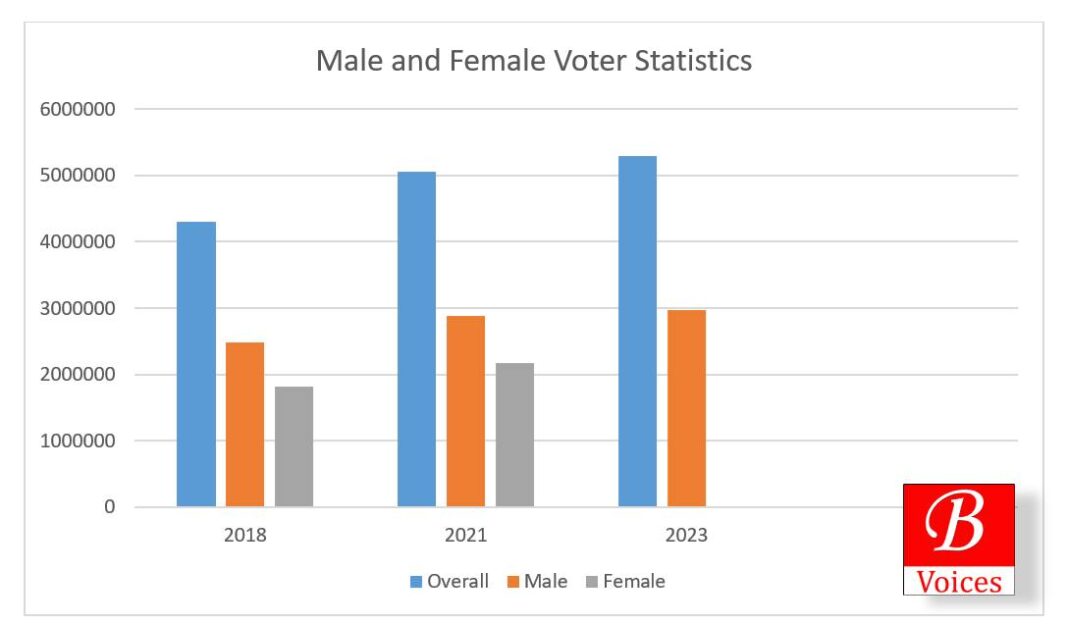
In the same vein, as per the data of PBS (Pakistan Bureau of Statistics), the population of Balochistan constitutes up to 14,894,402 whereas the total number of registered voters is 5,284,594. Statically, it can be said that over 9 million are not registered yet making only 35% population eligible to take part in the General Election 2023.
As far as voter turnout is concerned, there is no official mechanism in Pakistan to calculate it. However, other organizations such as FAFEN (Free and Fair Election Network) collect sex-segregated voting turnout in Balochistan and other provinces. As per the report of FAFEN, women’s vote turnout was less in both male and combined polling stations during the 2008 and 2013 elections. On the other hand, FAFEAN has produced a report analyzing the 2018 general elections as well. In this context, the report states that the elections witnessed 47% turnout with 57% males and only 33% females. As a result, the analysis has recorded a huge gender gap in voter turnout which is 24%.
Furthermore, the report also analyzed the NA-258 Loralai- Loralai-cum-Musa Khail-cum-Ziarat cum-Dukki-cum-Harnai. The constituency population was 821,856 with 135,089 females (43%) and 178802 males (57%). The voter turnout in the constituency was 53% with 41% females and 62% males indicating a huge gender gap in voter turnout as well. Lastly, the report also mentioned that approximately 43,713 fewer female voters took part as compared to the male voters.
It is important to mention that the ECP (Election Commission of Pakistan) prepares three types of polling stations during elections i.e., male, female, and combined polling stations. In male polling stations, only males can cast a vote whereas female ones are reserved for women. However, in combined polling stations, both males and females can cast votes. As compared to other provinces, the voter turnout for both males and females remained considerably low, which is not a good sign for the growth of participant culture.
Adnan Amir, a Political economy analyst based in Islamabad, also commented on the matter. He stated that one of the reasons behind fewer women’s participation in the voting process lies in the conservative cultural context of Loralai, particularly, and Balochistan, generally. Male family members and elders prefer women to avoid going outside. Secondly, logistical problems also play their part in the voting process. In tribal areas, if the polling station is even 5 km away women will not go until and unless their party affiliates or any other male family member arranges transport for them. Thirdly, men and women do not participate because they have lost trust in the system as well. Why vote if they believe the elected politicians will not do anything for them?
One of the ECP official, on condition to remain anonymous, answered some of the pressing queries. On a question regarding less female registered voters, he said that Balochistan is a tribal area. Generally, people make CNICs when they need it and not because they have turned 18 or they have to vote. Similarly, women in the area are not registered because the male members of the family do not make their ID cards. What is the point of registration and ID Card if women can not go outside? Moreover, he said that even men prefer to make ID cards when it is a requirement either for a job or visa purposes.
Following that, he mentioned that to understand election dynamics one has to understand the system of the province. In far-flung areas, there is no school, police station, or any levies check post. If there is no institution then this election process is just an activity that involves only a few members of the society. Similarly, he mentioned that a few days back he visited a proposed site for a polling station. The building was a school with just one person supposed to deal with the upcoming elections.
He continued;
“In far-flung areas, only a small portion of society engages with the electoral process. If the village has 500 registered voters, they make a deal with political parties that this party would get 250 votes while the half votes would go to the next party. I know it is illegal but this is what is favorable to the tribal structure where no institution exists.”
When asked about how the ECP staff allows all this, he said that because the staff knows no one will investigate this fuss. Besides, the staff are the locals of the area who prefer to go with the flow and not be involved in the electoral procedures.
However, he mentioned that several NGOs are working in the area to educate voters of the province. ECP has also devised district education committees that are spreading awareness about the registration and form process.
Lastly, Tayyeb Bukhari, district election officer, Loralai, said that their team is trying to facilitate voters as far as possible. In the context of awareness, his team has started a campaign on Twitter and Facebook as well. Lastly, regarding the form registration, he said that centers are established in every district so that people can easily access the registration forms I.e., Forms 21, 22, and 23. Form 21 is used to register or transfer votes. Form 22 is for the purpose of canceling votes while Form 23 is to correct any mistake in the details such as an error in name, date of birth, address, surname, etc. Tayyeb Bukhari also remarked that these forms are free of cost and available online on the page of the Election Commission.
The writer holds an M.Phil Degree in South Asian Studies from the University of Punjab. She can be reached on Twitter @TahiraGhilzai.
Click here to read previous articles of the writer.
Share your comments!


